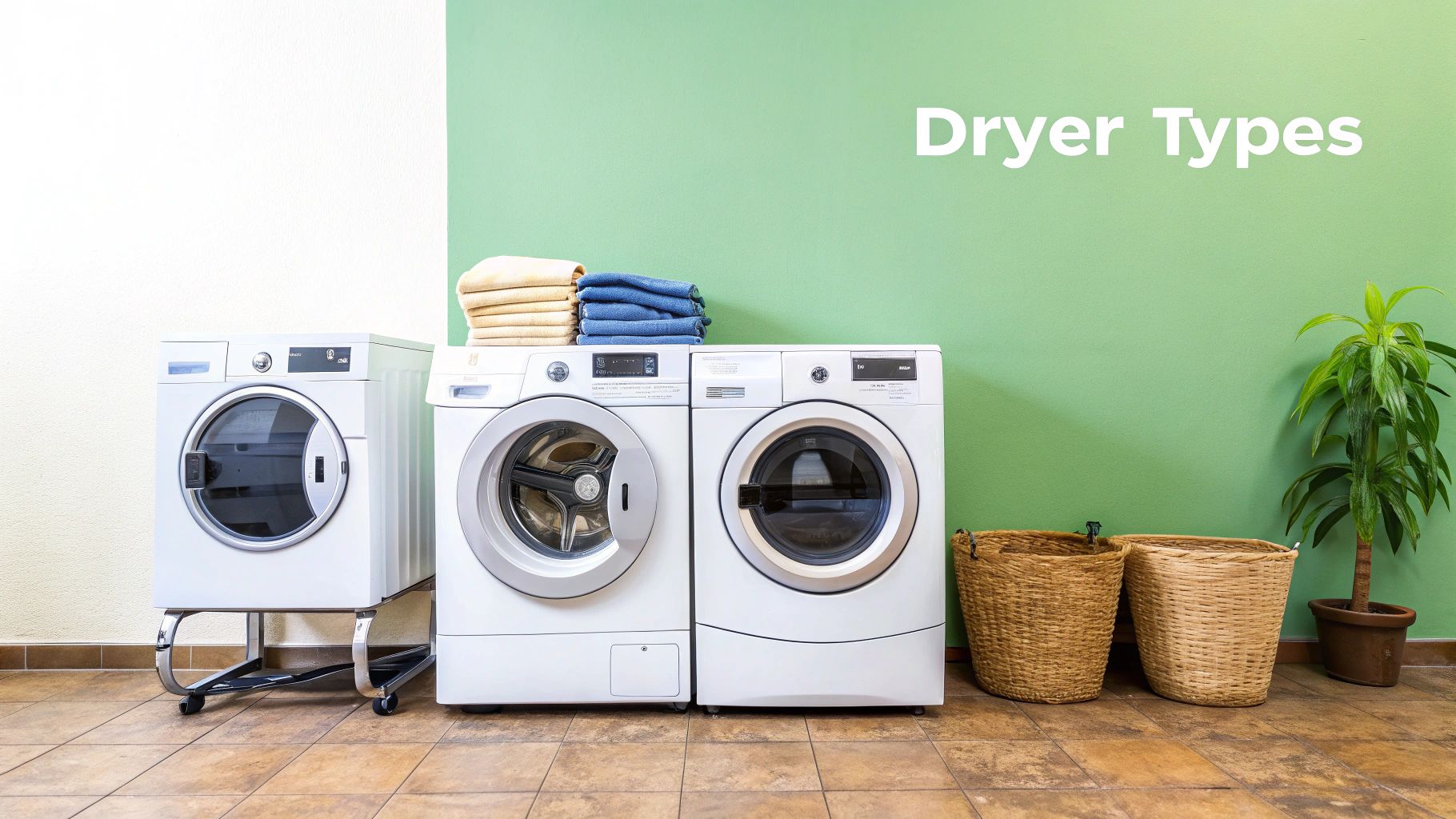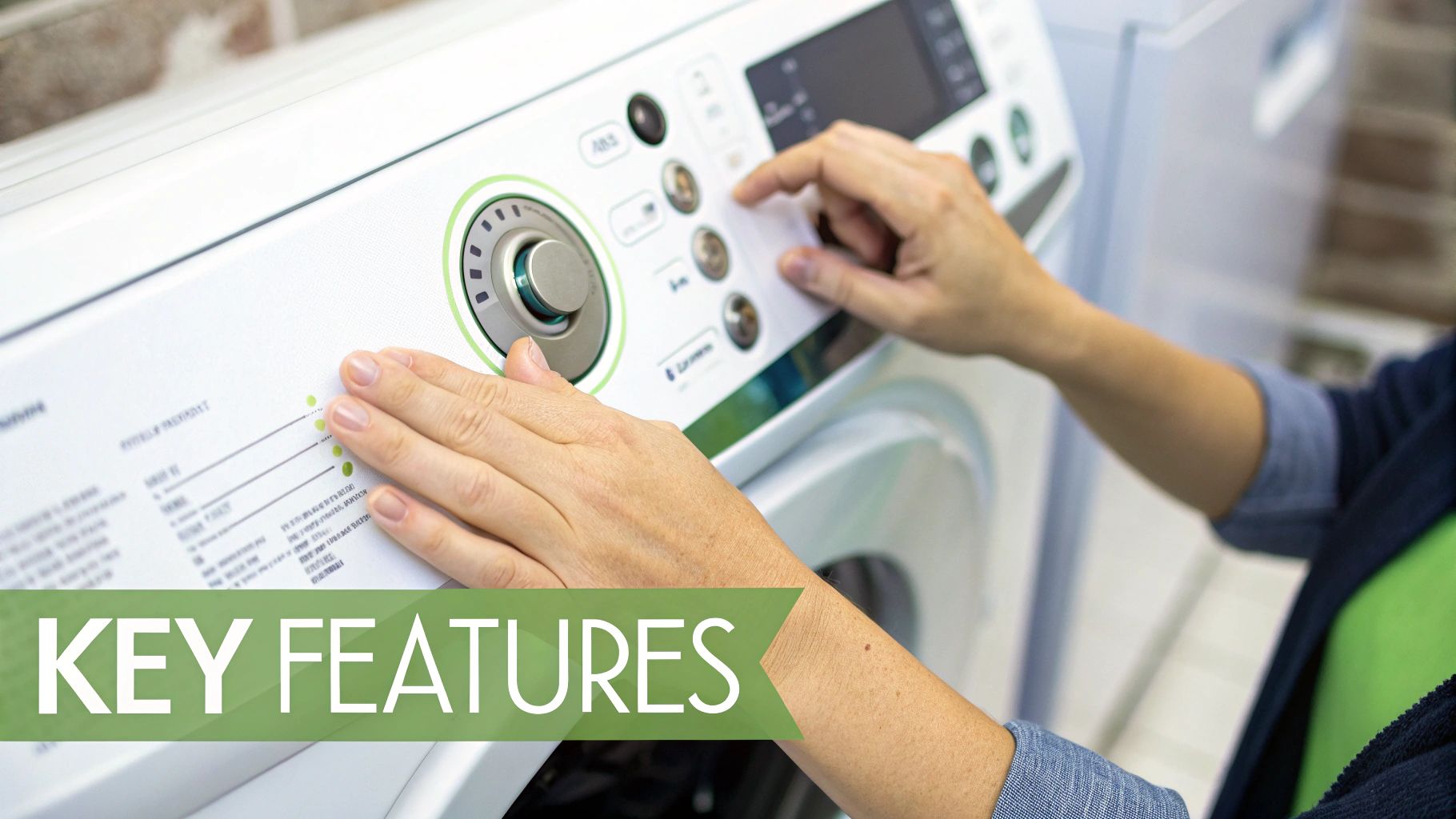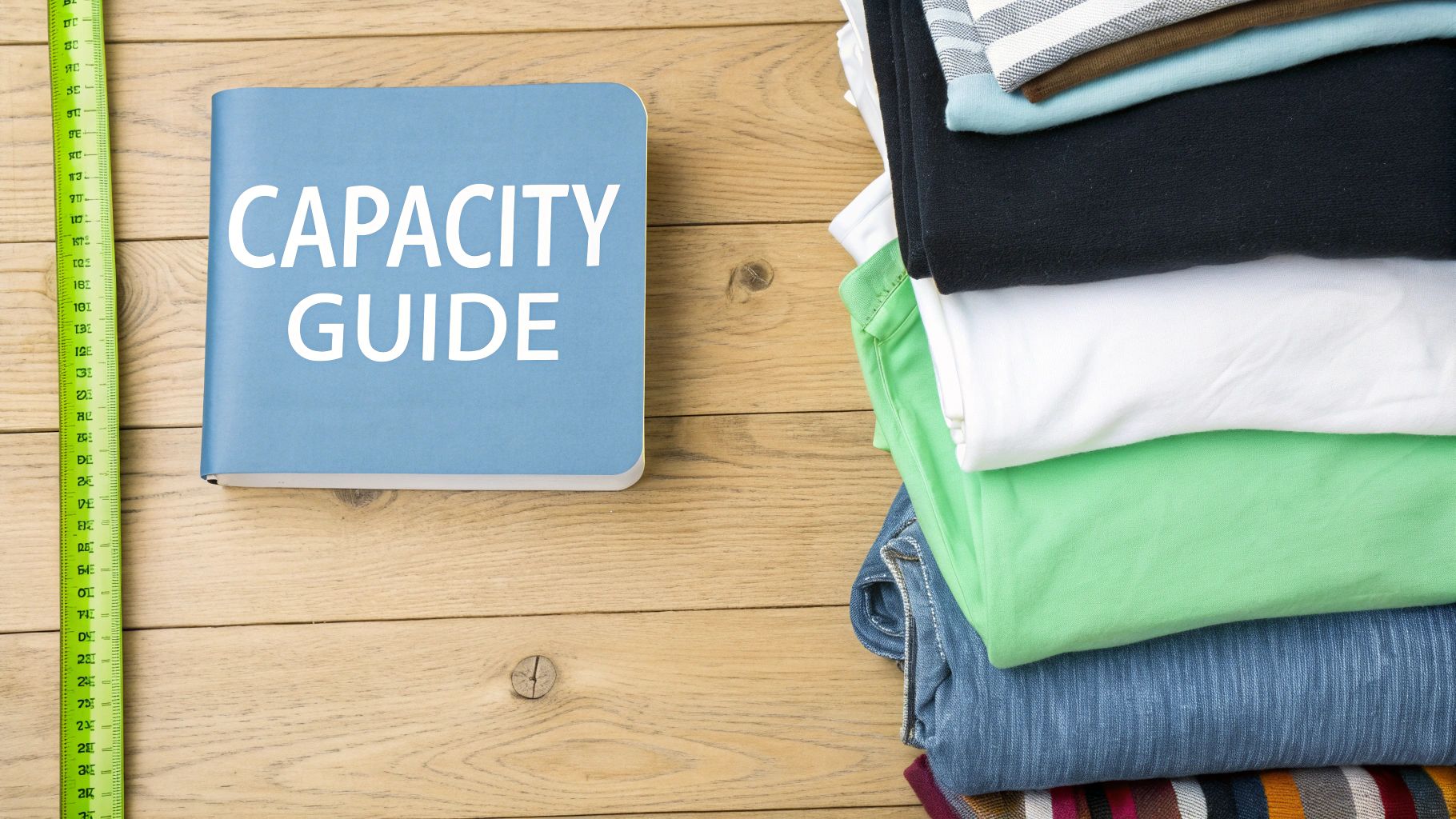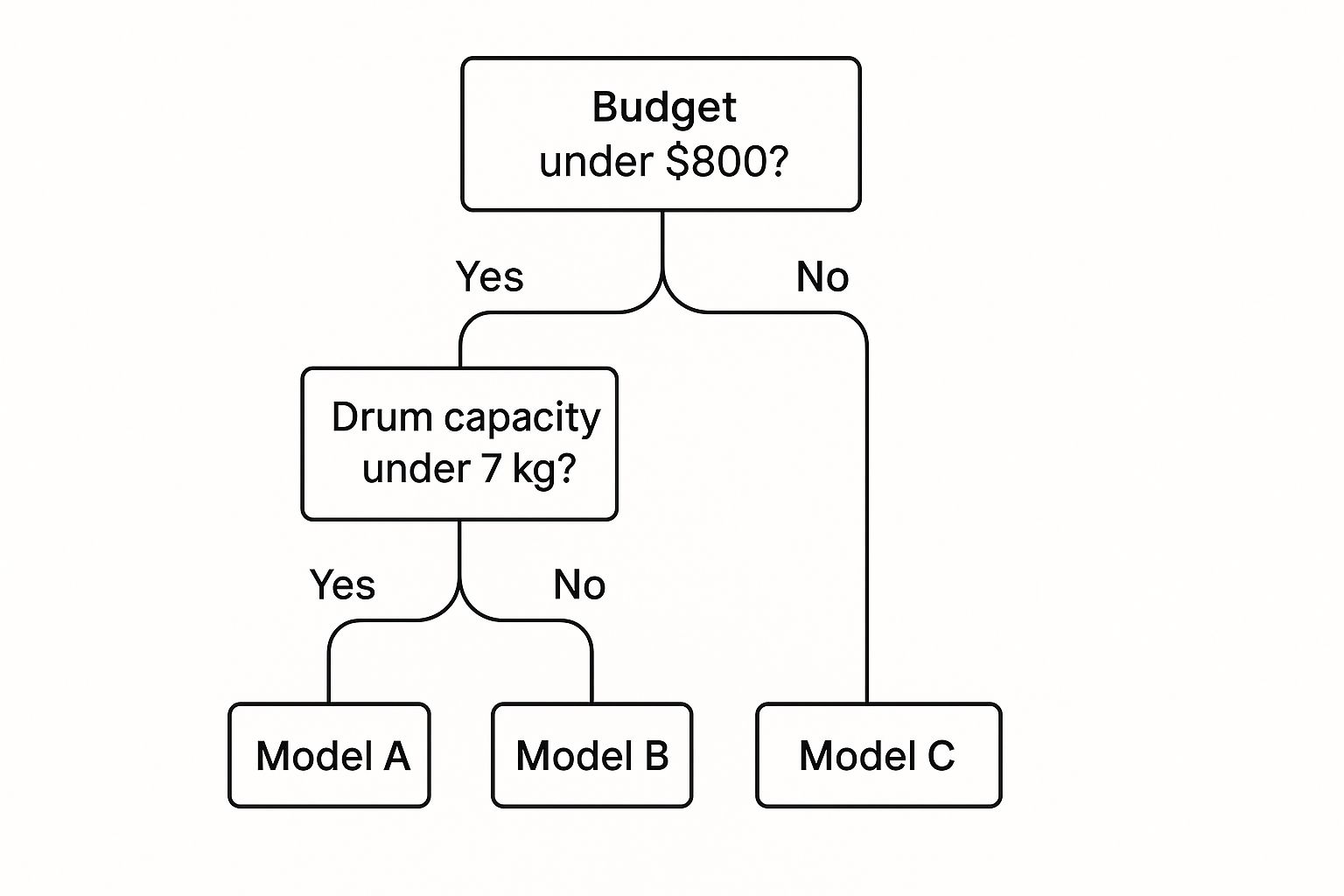
Clothes Dryer Buying Guide NZ: Find Your Perfect Dryer

Choosing the right clothes dryer for your New Zealand home means understanding the key differences between the three main types: vented, condenser, and heat pump. Each has its pros and cons, especially considering New Zealand's climate and housing styles. A careful decision is essential before you buy.
Vented Dryers: The Budget-Friendly Option
Vented dryers are generally the most affordable option. They work by pushing hot, damp air outside your home through a vent. This makes them fast and efficient, but they need proper ventilation. You'll need an external wall or window for the vent, which can be tricky for apartments or homes without easy outside access.
Condenser Dryers: Flexibility For Tight Spaces
Condenser dryers collect moisture from your clothes into a container you have to empty regularly. This makes them more flexible to install because they don't need external venting. They're a popular choice for apartments and smaller homes. However, they produce more heat in your laundry room and can be a bit less energy-efficient. This extra heat can be uncomfortable during New Zealand's summers.
Heat Pump Dryers: Energy Efficiency Champions
Heat pump dryers are the premium option. They recycle the hot air inside the dryer, reducing energy use significantly. This makes them the most energy-efficient type, potentially saving you a lot of money on your power bill over time. They do have a higher initial cost compared to vented and condenser models. However, for those focused on environmental impact and long-term running costs, the upfront investment can be worth it. Tips You Need to Know When Buying Appliances offers additional helpful advice.
Understanding these key differences is crucial when choosing a clothes dryer. Each type suits different needs and living situations. Your priorities—affordability, flexibility, or energy efficiency—will heavily influence your decision. Think about things like installation requirements and running costs to make the right choice for your NZ home.
Why Energy Ratings Actually Matter For Your Power Bill

In New Zealand, electricity costs can put a strain on household budgets. Energy efficiency is a key factor in managing these expenses, especially when it comes to appliances like clothes dryers. This section explores how energy ratings directly impact your power bill and contribute to significant savings.
Understanding The Energy Star Rating System
The Energy Star rating system, a scale from 1 to 6 stars, helps consumers identify the efficiency of appliances. Higher stars signify greater energy efficiency and lower running costs. For example, a 6-star dryer uses considerably less electricity compared to a 2-star model. Energy Star ratings are designed to make comparing appliance efficiency simple and straightforward.
This difference in energy consumption translates to noticeable savings on power bills. Learn more about the Energy Star rating in NZ. Given New Zealand's energy market, these savings are especially valuable.
How Energy Ratings Impact Your Wallet
Consider two families with similar laundry habits: one using a 2-star dryer and the other a 6-star model. The family with the 6-star dryer could save between $200 and $400 annually.
Over the dryer's lifespan, these savings accumulate, potentially offsetting the initial cost of a more efficient model in just a few years. The long-term financial benefits are substantial.
Capacity and Efficiency: A Balancing Act
Dryer capacity also affects energy use. A larger dryer isn't always the most efficient choice, especially if you rarely fill it completely. A half-empty 10kg dryer consumes more energy than a fully loaded 7kg model.
Therefore, choosing a dryer capacity that suits your household's laundry needs is essential for optimal efficiency. A smaller family might find a smaller, high-efficiency dryer more economical than a larger one.
Beyond The Stars: Features That Contribute To Savings
Beyond the Energy Star rating, other features contribute to energy savings. Sensor drying technology automatically adjusts the drying time based on moisture levels, preventing over-drying. Selecting appropriate drying cycles for different laundry types also impacts energy consumption.
By considering both the star rating and these additional features, you can make an informed purchase that saves you money and benefits the environment. As consumer preferences shift towards energy efficiency, as evidenced by the 47% of clothes dryers sold with 6 stars or above in the year ending March 2024 (see NZ Clothes Dryer Market Trends), making an informed choice is more critical than ever.
Essential Features That Transform Your Laundry Experience
Now that we understand dryer types and energy ratings, let's explore the features that can truly elevate your New Zealand laundry routine. From sensor drying and specialised programs to noise reduction and smart connectivity, understanding what’s truly beneficial versus simply adding cost is key to making an informed decision.
Sensor Drying: A Smart Approach To Fabric Care
Sensor drying uses sensors to measure moisture levels, automatically adjusting drying time. This prevents over-drying, protecting fabrics and saving energy. It also eliminates guesswork, ensuring perfectly dried clothes every time. This is a significant advantage for busy Kiwis looking to protect their clothing investments.
Program Options: Tailored Care For Every Fabric
Multiple drying programs cater to diverse fabrics and needs. Look for dryers offering dedicated cycles for wool, delicates, and bulky items like duvets or sports gear. A wool cycle, for example, utilises lower temperatures and gentler tumbling to prevent shrinking. A bulky item cycle ensures even drying for larger items. These specialised cycles maintain clothing quality and extend their lifespan.
Time-Saving and Convenient Features
Timer delay functions let you schedule drying cycles to leverage off-peak electricity rates, potentially lowering your power bill. A steam refresh cycle quickly de-wrinkles clothes without washing, ideal for freshening garments between wears. These convenient features streamline your laundry routine.
Practical Considerations For NZ Homes
Noise levels are crucial, especially in apartments or open-plan homes. Seek dryers with noise reduction technology for quieter operation. Child safety locks offer peace of mind for families with young children. For more tips, check out this helpful resource: Tips You Need to Know When Buying Appliances.
Smart Connectivity: The Future of Laundry?
Some dryers offer smart connectivity, allowing remote control and monitoring via a smartphone app. While convenient, consider if this premium feature aligns with your budget and needs before investing. Choosing the right features makes laundry more manageable and enhances your overall laundry experience.
Getting The Size Right For Your Household Reality

Choosing the right dryer size is a big decision for any New Zealand homeowner. A dryer that’s too small means endless cycles, while an oversized one gobbles up energy and precious laundry space. This guide will help you find the perfect dryer for your needs.
Matching Dryer Capacity To Your Laundry Needs
Dryer capacity, measured in kilograms, indicates the weight of dry clothes it can handle. For singles or couples with minimal laundry, a 4-5kg capacity is often enough. Larger families, however, will likely need a 7-10kg model for efficient drying. A comprehensive clothes dryer buying guide nz can offer valuable insights into choosing the right capacity.
Your washing machine capacity is another key factor. A mismatch between washer and dryer capacities can create a laundry bottleneck. For example, an 8kg washer paired with a 4kg dryer means splitting every wash load in half.
New Zealand-Specific Considerations For Capacity
Think about your lifestyle and laundry habits in New Zealand. Do you regularly wash bulky items like winter coats, duvets, or sports gear? These items need more space to tumble dry effectively, making a larger capacity dryer a worthwhile investment.
Trying to dry a thick winter duvet in a small dryer can lead to uneven drying and longer drying times. A larger dryer ensures proper air circulation, even for bulky items. A good clothes dryer buying guide nz will highlight these practical considerations.
To help you choose the best dryer for your household, we've compiled a handy guide:
Dryer Capacity Guide For NZ Households
Recommended dryer capacities based on household size and typical load requirements
|
Household Size |
Recommended Capacity |
Typical Load Examples |
Drying Time |
|---|---|---|---|
|
1-2 people |
4-5kg |
Everyday clothes, towels, small bedding |
~60 minutes |
|
3-4 people |
7-8kg |
Larger loads of clothes, towels, sheets, some bulky items |
~75 minutes |
|
5+ people |
9-10kg |
Multiple loads of clothes, large bedding, bulky items like duvets |
~90 minutes |
Drying times are approximate and can vary based on fabric type and dryer model.
This table offers a starting point for determining the right dryer capacity. Remember to factor in your specific laundry needs and lifestyle.
Space-Saving Strategies For NZ Homes
Physical dimensions are crucial, especially in smaller New Zealand homes or apartments. Carefully measure your laundry space, accounting for not just the dryer's width and depth, but also door clearance. Some models offer reversible doors for greater placement flexibility.
Compact dryers are available for tight spaces, but they typically have smaller capacities. It’s all about finding the balance between a space-saving design and sufficient drying power. A detailed clothes dryer buying guide nz will explain the trade-offs between compact and full-size models. Don't forget ventilation for vented models – a critical aspect often covered in a reliable clothes dryer buying guide nz.
Smart Budgeting Beyond The Sticker Price
Buying a clothes dryer in New Zealand involves more than just the initial cost. Smart budgeting means considering the total cost of ownership, including installation, running costs, and potential maintenance. Let's break this down to help you make a sound financial decision.
Understanding Price Ranges in the NZ Market
Clothes dryer prices in New Zealand vary widely. Basic vented models start around $500, while premium heat pump dryers can cost over $2000. Condenser dryers usually fall somewhere in the middle. Understanding these price ranges is key to setting a realistic budget. The broader domestic appliance retail sector, which includes clothes dryers, reached an estimated $2.3 billion in 2025. Whitegoods, like dryers, formed the largest segment. This shows the considerable market for these appliances and the range of options available. More detailed statistics can be found here: NZ Domestic Appliance Retailing.
Installation Costs: A Hidden Expense
Installation costs can significantly impact your overall expenditure. Vented dryers often require professional ductwork and external venting, which can push up installation costs. Condenser dryers, however, typically only need an electrical connection, simplifying the installation.
Calculating Long-Term Running Costs
Operating costs depend heavily on energy ratings and your usage. Energy-efficient models can save you $200-400 annually on electricity costs compared to less efficient options. This means a higher upfront investment in an energy-efficient dryer can pay off over its lifespan. You might find this article interesting: Heat Pump Dryer: Energy-Efficient Laundry for Kiwi Homes.
Factoring in Maintenance, Warranty, and Lifespan
Maintenance costs, warranty value, and expected lifespan are crucial long-term factors. Some dryers require minimal upkeep, while others might need regular cleaning or filter replacements. A longer warranty offers peace of mind and can save you money on future repairs.
Exploring Incentives and Financing Options
Government incentives and retailer financing options can also influence your choice. Some retailers offer interest-free periods or payment plans, making a larger initial investment more manageable. Government rebates or incentives for energy-efficient appliances can further reduce your expenses. By considering all these factors, you can make an informed decision and choose a dryer that suits both your budget and laundry needs.
Navigating NZ Retailers For The Best Deal
Finding the perfect clothes dryer involves more than just picking the right make and model. You also want the best possible price. This means understanding the New Zealand retail scene, both online and in brick-and-mortar stores. Major retailers like Harvey Norman, Noel Leeming, and The Warehouse each offer their own advantages, from competitive pricing to delivery options across the country. However, be careful, what's on sale is not always the best price or offer. Another important issue is after sales service. Dealing with a large corporate can have its disadvantages when it comes to returns or dealing with an after sale issue. With industry buying groups now prevalent most retailers can compete on price plus the smaller retail independents have generally the advantage of being more responsive to customer issues. The large corporates no longer have the advantage of scale and rarely do well in annual surveys on customer service.
Online vs. In-Store Shopping
Online shopping makes it easy to compare prices and read customer reviews. Websites like Folders, provide detailed product specifications and information and competitive pricing. For a comprehensive comparison of online and in-store appliance shopping in NZ, check out this helpful article: Where Should You Buy Your Appliances?.
Physical stores offer the advantage of seeing the dryer in person. You can touch it, examine its features, and get a real feel for its size and build. Sales staff can also answer questions about specific models, warranties, and installation. However, a point to remember is sale staff are often given financial incentives to promote a particular brand. Commission selling is very prevalent in traditional appliance retail so there is a risk that any suggestions or recommendations provided may be influenced by factors that are not in your best interests. Increasingly, the global trend is to purchase from online retailers, particularly as their information content and customer service improves. Reputable online retailer's like Folders.co.nz deliver better value for money and are gaining trust from the consumer resulting in a growing share of the market.
Key Questions to Ask Sales Staff
Don't be afraid to ask sales staff important questions about warranty coverage, installation options, and after-sales support. These are crucial details that can prevent future issues. Also enquire about price-matching policies, free extended warranties, and any available payment plans. Do not be convinced to buy extended warranties as both the retailer and manufacturer have obligations under the Consumer Guarantees Act to make things write if failure occurs during the expected lifetime on the product.
Finding the Best Deals
Timing is everything when it comes to savings whether you purchase online or through a store. Look out for big sales events like Boxing Day or end-of-financial-year clearances. Smart shoppers should also look beyond the initial price tag and explore ways to save money in the long run. For some helpful tips, take a look at this article: 7 Tips for How to Save Money on Christmas Lights. The principles discussed can often be applied to larger purchases as well.
The growth of online shopping has transformed the retail landscape. Retailers are adapting by offering competitive online deals and improved digital experiences. This gives buyers more options than ever for comparing prices, features, and energy ratings. You can find more insights into the NZ appliance retail market here.
Final Checklist Before Purchasing
Before you buy, make sure you're clear on stock availability, delivery timeframes, and return policies. This will ensure a smooth and stress-free purchase. By considering all these factors, you can confidently navigate the NZ retail market and secure the best deal on your new clothes dryer.
Your Final Decision Framework and Action Plan
Making the right clothes dryer purchase in New Zealand requires careful consideration. This section provides a structured approach to transform your research into a confident purchase, avoiding common pitfalls and ensuring long-term satisfaction.
Evaluating Your Needs and Priorities
Begin by defining your household’s needs. What's your budget? What capacity do you need? What are your space limitations? Do you prioritise low running costs, maximum convenience, or specific features suited to New Zealand's climate? Thinking about your personal brand can also help clarify your needs, much like choosing the right tools for professional development. For additional resources on clarifying your priorities, check out these helpful personal branding books.
Coastal dwellers might prioritise rust-resistant materials. Those in cooler southern regions might favor dryers with faster drying times for bulky winter clothes. Urban apartment living often necessitates compact, quieter models.
Comparing Shortlisted Models Objectively
Once you've identified your priorities, compare shortlisted dryer models based on performance data and user reviews. Look beyond marketing and focus on actual energy consumption, drying time for different load types, and noise levels.
Consider New Zealand-specific needs like drying bulky winter clothing or managing humidity. This requires a dryer that handles large loads and ensures proper air circulation. To help visualise recommended models based on budget and capacity, take a look at the infographic below.

As the infographic illustrates, balancing budget and capacity leads to several options. Whether you're looking for an affordable, smaller capacity dryer or a larger capacity model, there are recommendations to suit your situation. To further compare key features, review the table below.
To help you make a well-informed decision, we've compiled a comparison table highlighting the key features of different dryer types. This table provides a side-by-side comparison to assist in your evaluation process.
Clothes Dryer Comparison: Key Features Overview
Side-by-side comparison of vented, condenser, and heat pump dryers across important buying criteria
|
Feature |
Vented Dryer |
Condenser Dryer |
Heat Pump Dryer |
|---|---|---|---|
|
Installation |
Requires external venting |
Flexible placement, requires drainage or emptying container |
Flexible placement, no venting required |
|
Operating Cost |
Lowest |
Medium |
Highest (initially) |
|
Energy Efficiency |
Lowest |
Medium |
Highest |
|
Drying Speed |
Fastest |
Medium |
Slowest |
|
Purchase Price |
Lowest |
Medium |
Highest |
|
Maintenance |
Low |
Medium (requires emptying/cleaning) |
Medium (requires filter cleaning) |
This comparison highlights the trade-offs between the different dryer types. While vented dryers offer the fastest drying speeds and lowest upfront cost, they lack flexibility in placement and are the least energy-efficient. Heat pump dryers, though the most expensive initially, offer the highest energy efficiency in the long run. Condenser dryers fall somewhere in between, offering a balance of cost, efficiency, and placement flexibility.
Practical Considerations and Action Plan
Finally, consider the practical aspects. Ensure compatibility with your electrical supply. Coordinate delivery and installation, considering any necessary ductwork or venting modifications. Register your warranty to protect your investment.
-
Delivery and Installation: Confirm delivery costs and timeframes. If professional installation is required, obtain quotes and schedule accordingly.
-
Electrical Requirements: Verify the voltage and amperage requirements of your chosen model.
-
Warranty Registration: Register your warranty promptly. This ensures coverage if needed.
This structured approach helps you select a clothes dryer that suits your household's needs and budget for years to come. Ready to find your perfect dryer? Explore the selection available at Folders.
